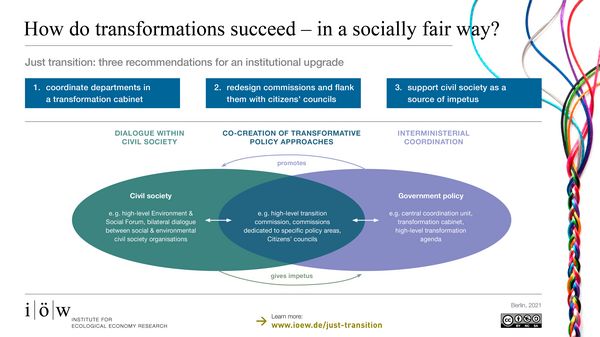Contact:
Ulrich Petschow is a senior economist at the Institute for Ecological Economy Research. From 1992 to 2018, he headed the research field Environmental Economics and Policy at the IÖW. His research focuses on innovation and technology analysis, economic instruments and new forms of governance, transformation strategies, and regional economic policy.
Ulrich Petschow
Phone: +49-30-884 594-23
ulrich.petschow@ioew.de
Press contact:
Richard Harnisch
Institute for Ecological Economy Research (IÖW)
Potsdamer Str. 105
D-10785 Berlin
Tel.: +49 30/884594-16
kommunikation@ioew.de

Bringing together environmental and social policy: Researchers call for transformation cabinet

► How can sustainability transition succeed - in a socially acceptable way? The Institute for Ecological Economy Research and the Open Society Foundations recommend "updates" of German policy-making structures to develop policies for a social-ecological transformation
► A socially just transition must be the common goal of all federal ministries, which should be coordinated through a transformation cabinet
► Citizens' councils and advisory commissions must seek compromise solutions and social and environmental NGOs should cooperate more closely
Berlin, September 2, 2021 – It is becoming increasingly clear that environmental and climate protection and social justice are two sides of the same coin and can only be advanced together. In order to usher in the necessary substantive steps, new institutional structures are needed to consolidate interministerial cooperation, particularly between the environmental and social policy ministries, the Institute for Ecological Economy Research (IÖW) and the Open Society Foundations recommend in a policy briefing published today. They advise policymakers to develop the climate cabinet into a comprehensive transformation cabinet in which social policy actors are also included which is currently not the case. This cabinet should receive advice from citizens' councils and societal commissions including interest groups, policy makers as well as civil society organizations. Trade unions, social, welfare and environmental organizations should also initiate overarching processes of communication, capacity building and working together. In this way, the just transition – a socially just ecological transformation of the economy and society – can succeed.
Just transition: Restructuring society in a sustainable and just way
For some years now, there has been a growing awareness in the German political arena that social and ecological issues are closely interrelated: The German Federal Environment Minister Svenja Schulze has declared "just transition" to be the guiding principle of climate policy. "Discussions are underway, for example, to repay revenues from eco-taxes in such a way that poorer people benefit in particular. “This can be a useful first step," says economist Ulrich Petschow of the IÖW: "But what matters is to significantly reduce the ecological footprint of everyday life. To make this transformation fair, we need new structures such as a forum for exchange processes between ecological and social interests." In their paper "Transformation? Yes, but equitable! New Institutional Structures for a Just Transition" the researchers from the IÖW propose various bodies and strategies to anchor the just transition in Germany's institutional structures.
The federal government must better coordinate cooperation
Environment, treasury, economy, transport, construction and agriculture: five ministries came together in the climate cabinet in 2019 to develop interministerial solutions. "We propose to further develop the climate cabinet into a transformation cabinet with far-reaching competencies," explains IÖW transformation scientist Florian Kern: "The state must develop integrated and effective approaches that combine ecological and social issues. And in such a transformation cabinet, the Federal Ministry of Labor, for example, which has not been involved in the climate cabinet so far, definitely belongs at the table."
This transformation cabinet should not make top-down decisions, but involve citizens' councils and scientists in the preparation of decisions and strengthen the diverse bottom-up activities, in particular through long-term support for cooperation between trade unions, environmental, social and welfare organisations. "New structures are needed within which communication processes between different actors can be solidified in the long term, for example in an 'Environment & Social Forum'. In this way policy approaches can be developed collaboratively," Petschow said. "We can only shape these processes in a fair way if different interests are involved in the decision-making process." More transformation commissions should be set up at the interface between the state and civil society to develop strategies and measures for individual fields of action such as energy or mobility. Unlike the coal commission in 2018/19, however, the participation processes must move away from the compromise of the lowest common denominator toward sustainable solutions that meet the policy targets set by the German government.
Civil society needs new funding instruments
In a three-year project, the researchers also investigated how trade unions, social and environmental organizations can better work together. Although the number of joint actions and campaigns is growing – recently, for example, the environmental NGO Friends of the Earth Germany and the Paritätische Wohlfahrtsverband launched a cooperation – long term overarching exchange and cooperation structures across civil society organisations are still lacking. "When it comes to bringing together social justice and effective climate protection, citizens seem to be ahead of politics. The Citizens' Climate Council adopted such a guiding principle with 97 percent agreement. More and more concrete proposals on this issue are also coming from civil society. What is needed now are forums and forms in which these approaches can be brought together and discussed, further developed and implemented with policymakers," demands Dr. Finn Heinrich of the Open Society Foundations.
On September 7, 2021, the researchers presented their proposals at a digital event and discussed them with representatives of the SPD, FDP, Bündnis90/Die Grünen and Die Linke. There was a broad agreement that this is a very important topic, that sustainability transitions need to be managed in socially acceptable way, that citizens should be involved more. The panelists expressed a variety of views on some of the proposed new structures such as the further development of the climate cabinet into an transformation cabinet.
~~~~~~~~~~~~~~~~~~~~~~~
Download:
IÖW-Impulse: Transformation? Yes, but equitable! New institutional structures for a just transition (PDF, 0.8 MB)
Press graphic: (jpg, 0.5 MB)

